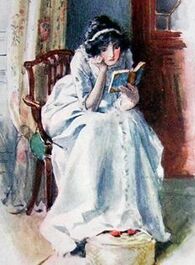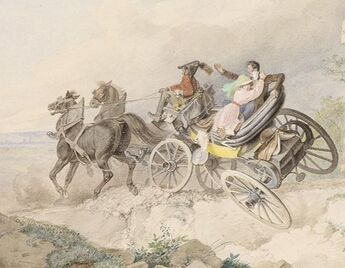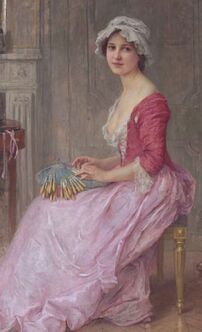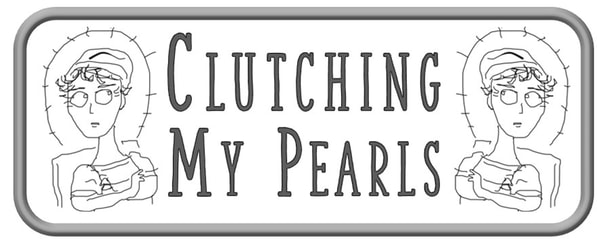| "As for the common trash of novels, under which the press has groaned, which have introduced so wretched a taste of reading, and have been so hurtful to young minds, particularly of the female sex, they are unworthy to be named, except in the way of censure." -- The English Review, Or, An Abstract of English and Foreign Literature, Vol V, 1785 |
 Catherine Morland engrossed in a novel
Catherine Morland engrossed in a novel Charles Robert Maturin was a writer of gothic novels. But he was also one of the critics who wrote dismissively of sentimental novels and the people who read them and wrote them.
“The path of novel-writing once laid open was imagined easy by all, and for about forty years the press was deluged with works to which we believe the literary history of no other country could produce a parallel. The milliner’s prentices who had expended their furtive hours, and drenched their maudlin fancies with tales of kneeling lords and ranting baronets at the feet of fair seamstresses, fair as they believed themselves to be, and in narrow back parlours as dark as their own, soon found it easy to stain the well-thumbed pages of a circulating library book with flimsy sentiments, and loose descriptions of their own..."
Just like Austen, Maturin wrote a pretty funny parody of this type of novel. Read on for more...
 The Novel Reading, Josef Danhauser
The Novel Reading, Josef Danhauser Austen wrote her parody for private family amusement, but the above-quoted critic, Charles Robert Maturin, published an extended satire of sentimental novels, specifically the epistolary novel.
The entire satire is here, and I have excerpted most of it below.
“The heroine must be exquisitely, unimaginably beautiful, though two chapters are usually devoted to the description of her charms, or, as we should word it, “her transparent loveliness:” on the subject of her eyes being black or blue, we find nearly a division of authorities, and therefore do not dare to decide on a question of such delicate importance…
"She must be an orphan (if a foundling, so much the better), left mysteriously in the care of some opulent and noble family, who most unaccountably (considering their character for prudence) suffer her to board and lodge with them, and water her geraniums until the decisive age of sixteen, though conscious that the noble and enamoured heir of the family has been in love with her from their mutual cradles, which by a malicious contrivance of Cupid were placed next each other in the nursery.
"Now comes on the trying part of the business, the heroine is distracted by the ambition of the father, the pride of the mother, and the jealous insults of the sisters, not forgetting a snug misery of her own arising from the persecution of some desperate baronet, who, every night leaps the garden wall for the cold consolation of seeing the farthing candle twinkle in his mistress’s garret, where she weeps over the indignity of proposals urged by the steward’s nephew in the house, or the grocer’s heir in the village, to whom all the family…. are resolved on uniting her as a punishment for her presumption, and a security against their own disgrace. This supposed lover, this interloper in Cupid’s territories, must…. [have] a squint, and red hair, but in any case his legs must be bandy.
"Persecuted by love and hatred, she flies, flies over mountains without a stain on her white satin slippers, and is rumbled two hundred miles in a stage coach without a rent in her gossamer drapery. She must be run away with five or six times before she reaches the end of her journey (a trifling interruption, as she happens not to know where she is flying to), and it is on such occasions that she displays that extraordinary contrast of physical debility and mental independence, of fragility and hardihood, that constitutes the very essence of a novel heroine.
 "Overturning carriage in front of Vienna," Anonymous
"Overturning carriage in front of Vienna," Anonymous "[A]nd after all this, she has resolution enough, though she never drew a trigger, to hold a loaded pistol to the head of her profligate seducer; to burst, scramble, and tear her way through casement, thicket, forest, and fence, to secure her retreat; and then, with the strength of a horse and the courage of a lion, to seat herself, without a sous in her pocket on the top of a stage-coach….
"When the vehicle breaks down (for this it must do) she can tramp in her silk stocking feet, and her whole wardrobe in a cambric handkerchief (that has never been washed but in her tears) straight up Piccadilly, and then new troubles begin: every gentleman she sees follows her, and, at last, sinking under the consciousness of beauty, misfortune, and wet feet, she trembles, totters, or glides into the back parlour of a shop in the Strand, to beg for a glass of water; for heroines at the last gasp must never take anything stronger; finds a congenial soul in the interesting face of the shopkeeper, who, with incredible liberality, offers her a gratuitous asylum (so like London shopkeepers) and, lovely and humble… she takes her station in a slip of a room where half the peerage crowd the shop every day to peep at her through a canvass blind.
 The Lace Maker, Charles-Amable Lenoir
The Lace Maker, Charles-Amable Lenoir "At length, the interesting matron turns out a procuress in due form; and in spite of the industry and taste of the heroine (which by this time ought to have secured her a comfortable property in the three per cents) arrests her for board and lodging, or charges her with theft, drags her before a magistrate, and just as she is about to be fully committed... the magistrate ogling at her all the while, and is disappearing through one door, the hero enters through the other, clasps her to his bosom… swears that nothing shall divide them, and in proof of his asseveration draws his sword...
"[I]n the struggle, her wig or her handkerchief (we forget which) drops off, and her mole cinque-spotted, or strawberry-mark, or something equally conclusive or satisfactory, is discovered, by which she is proved to be a duke’s daughter or a peeress in her own right; her noble family in the same breath recognize her, and give their consent to her marriage; her disappointed lovers, one and all, pair off with the “sweet friends,” into whose sympathizing ears her epistolary sorrows have been poured through five volumes.
"The ten last pages are devoted to a description of the dress for the wedding; much honourable mention is made of white satin, and due notice of hartshorn…"
Although this is a satire, I think we can learn from it, because it is a distillation of dozens and dozens of novels. We recognize the theme of the heroine as damsel in distress who is buffeted about by fortune but maintains her dignity and of course her chastity. The theme of the orphan or foundling is also apparent. The friendless situation of Fanny Price in the great house at Mansfield is hardly unique in the literature of the long 18th century. The heroine gets her reward in the end and it means she no longer has to work for a living; her rank and status in society is confirmed and she marries her Prince Charming.
This is one reason why I am skeptical of feminist interpretations of--for example--Fanny Price in Mansfield Park. Why are modern scholars so certain that Fanny's relationship with the overbearing Sir Thomas must be an allegory of slavery? If Fanny is an allegorical enslaved person, then what about the literally hundreds of other heroines in similar straits? Are they also representative of chattel slavery? Or, are they variations on the standard Cinderella story? To quote from my Quillette article:
| Dependent, poverty-stricken relatives were ubiquitous in life and in novels, but Mansfield Park‘s Fanny Price is not just another poor English girl, she’s the “white counterpart” of a slave (an argument made by Moira Ferguson in an influential 1991 essay)... To take one of many examples, in a recent article, Sarah Marsh says when Sir Thomas tells Fanny to leave the ballroom with “the voice of absolute power,” Austen is reminding us of a “system that grants English enslavers absolute power over their human chattels.” Opinions in anti-racist discourse are evolving rapidly, so I suggest that anyone planning to compare white girls dancing at balls to enslaved Africans might want to think again. |
Previous post: The hero as foundling Next post: Was Admiral Croft inspired by a character in an earlier novel?
| More blog posts about the dangers of reading novels, particularly romance novels, here and here. Anna, or Memoirs of a Welch Heiress (1797) is a four-volume weepie about a foundling who ends up in court accused of theft, just like the parody above, and just at that moment (at the end of Volume III), her long-lost uncle rushes up to explain who she is. In addition to the melodramatic plot and large cast of Dickensian characters, the novel includes more social commentary than you will find in Austen. |
| The Oxford History of the Novel in English attributes the essay I've quoted from to Charles Robert Maturin, (1780-1824) Maturin himself wrote gothic novels, so, like Austen, he could enjoy novels while laughing at them, I suppose. And he had a wife and four children to support. |

 RSS Feed
RSS Feed